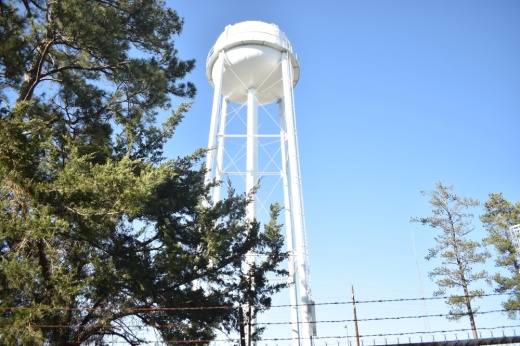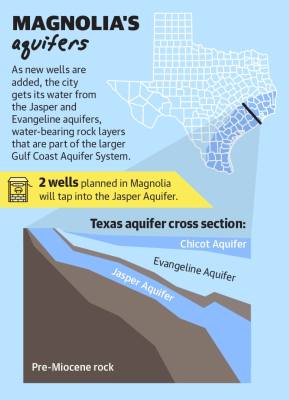With two wells in the works, City Engineer Mike Kurzy said he believes the moratorium could be lifted by this summer, depending on how construction goes.
“[The city is] doing everything they can, and we’re trying to do everything we can to help them out of that situation and try to get back in a situation where they’re not behind the eight ball like they are now,” Kurzy said in an interview.
The city has about 3,658 water connections, but none were available as of press time. One residential or commercial connection uses around 300-315 gallons of water and 270 gallons of wastewater per day. Around 11,000 new connections are expected to be needed from new developments over the next five years, Kurzy said.
As the city grows, its demand for water is also projected to grow. By 2050, the city of Magnolia is projected to have 8,912 residents and use 1,949 acre-feet of water per year, according to the Texas Water Development Board. In comparison, in 2021 the city used 645 acre-feet of water, according to the TWDB. One acre-foot of water is equivalent to 325,851 gallons.“To prepare for future water needs, cities should participate in the regional water planning process to identify, evaluate and recommend water management strategies and projects to meet their identified water needs,” TWDB Chief Communications Officer Lauren Munguia said via email. “It is also important that utilities manage and maintain their current assets to maximize the lifespan of the infrastructure.”
Magnolia Mayor Todd Kana said the city has sold $20 million-$22 million of certificates of obligation—a way to borrow money—to fund water well projects that will increase its water capacity, allowing new development to begin again.
Magnolia’s history with water
Before being hired by the city, AEI Engineering did an analysis of the city’s water capacity in May 2021 and anticipated around 200 connections per month coming online for the next five years, Kurzy said. Once the company was officially hired in September 2021, Kurzy said the company immediately identified the diminishing water connections.
“When we came on, the first thing I said is, ‘You guys don’t have enough water. There’s just not enough there,’” Kurzy said. “Now luckily, they were running less than that because we would have run out of water [in] early December [2022] or before.”
Kurzy said when he began working for Magnolia, the city was adding around 50 connections a month before it ramped up to 100 connections a month.
“So it would have been a lot worse had they gotten what the developers actually expected to build,” Kurzy said.
As the Magnolia area has grown, the city has sought to fund water and wastewater infrastructure and revise utility rates to continue serving its population.
Shortly after hiring AEI, the city settled with a group of local churches over a dispute regarding water fees in December 2021, Community Impact reported. The dispute was centered around water rates because in spring 2018, the city of Magnolia created an institutional category that applied to tax-exempt, nonprofit or government entities, moving them from the commercial water rate with local businesses to an institutional water rate that was higher. Through this new category, local church leaders said they saw water bills increase by 300%, according to previous reporting.
Kana maintains the point of the institutional rate was to be equitable, not to raise money for water infrastructure such as new wells.
“That was solely to make sure the rights were spread equitably amongst all the users,” Kana said.
However, around five months later, in May 2022, the city of Magnolia raised its impact fees per single-family connection—from $4,800 total to $7,400 total—to fund water infrastructure, Community Impact reported. Impact fees are one-time fees collected to fund a new water user’s share of the city’s water or wastewater capacity.
Pausing development
Kurzy said the city was preparing for a month before bringing the ordinance to City Council on Dec. 13 to enact a temporary development moratorium. The ordinance was adopted Dec. 21 and is expected to be in place for 120 days, although City Council can extend it.
“The moratorium had been mentioned probably two or three months in advance and only because we had seen that there were other places that had moratoriums,” Kurzy said. “We’re just trying to make sure that the City Council knew that they wouldn’t be the first one to enact a moratorium.”
In Central Texas, the city of Dripping Springs enacted a temporary development moratorium in November 2021 due to reaching its wastewater capacity. The moratorium lasted through September 2022.
In an email, the city of Dripping Springs said officials are aware of the need for additional capacity and have been trying to obtain that capacity.
During the moratorium period in Dripping Springs, two permits were denied, according to the city. Under Magnolia’s moratorium, there have been eight permit requests, City Administrator Don Doering said in a Jan. 26 interview.
Doering said no exceptions or waivers had been issued under the moratorium as of Jan. 26. Meanwhile, developments such as Heritage Green and master-planned community Audubon are trying to move forward.
“The good news is we got enough work done out in front of it that we think we’re good for the things we have opening in the near future,” Steve Gibson—co-owner and partner of Shadyside Land Co., which owns Heritage Green—said in an interview. “The things that have a little longer lead time will be dependent on Magnolia getting their work done and hopefully bringing additional capacity online.”
Sam Yager III, executive vice president of Sam Yager Inc. and developer of Audubon, said in an interview that some construction is able to continue in Audubon, which is expected to bring 4,000-5,000 homes to Magnolia in the next 12-15 years, Community Impact previously reported.
“And we are working with the city of Magnolia to try and assist them in any way possible to try and help them with their water and sewer concerns,” Yager said.
Audubon is working on its own well, anticipating getting it online in May, according to documents provided by the Audubon Management District.
Kana said the city had no choice but to enact the moratorium.
“There’s absolutely no way we could honestly continue to pretend the water was there and sell it like it was there only to have people discover it’s not really there,” Kana said. “So while it was hard to come to the realization [about] where we were, I really don’t think the city had a choice at that point.”
Plans for water
As Magnolia faces water challenges, the city is working on two new wells—No. 7 and No. 8.
Kurzy said AEI Engineering began working on Well No. 7 in September 2021. Meanwhile, council awarded a $2.89 million contract at its Jan. 10 meeting to Weisinger Inc. to build Well No. 8, which is anticipated to be completed in December.
Depending on how quickly Well No. 7 can be finished, Kurzy said he believes the moratorium could be lifted in August. Otherwise, the moratorium could continue through December.
As the wells come online, Kurzy said the city does not yet have a clear answer on how to distribute the new capacity.
“We say first come, first serve, but that may not happen either,” Kurzy said. “We’ve got to kind of look at where people are at in their development and try to find a realistic way to dole these out to where we can get to the next well.”
While the two wells are in the works, a temporary water system on the east side of the city, funded by the Magnolia 4A Economic Development Corp., went online Jan. 17 to alleviate water pressure issues, according to the Feb. 14 agenda packet. The EDC is paying around $25,000-$30,000 each month for service and equipment rentals, Doering said.
City Council also approved an agreement with Magnolia East 149 LLC, a subsidiary of Magnolia Place developer Stratus Properties Inc., to fund an additional water supply plant at its Feb. 14 meeting. Anticipated to cost $6.29 million, the project will include a 1,500-gallon-per-minute well and a 400,000-gallon ground storage tank, among other equipment, according to the agenda packet.
Through the agreement, Magnolia East 149 LLC will facilitate and administer the design and construction of the project in exchange for the city funding and owning it after completion, according to the agenda packet.
Kurzy said the plan is to continue building two wells a year as needed to meet demand.
"There’s plenty of blame, plenty of places to point the finger,” Kana said. “The biggest thing is we are on top of this now, and hopefully within a few months, we’ll be ahead of it, and our problems will be solved.”







